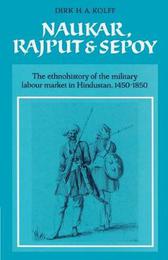
|
Naukar, Rajput, and Sepoy: The Ethnohistory of the Military Labour Market of Hindustan, 1450-1850
Paperback / softback
Main Details
Description
This is a study of an aspect of the ethnohistory of North Indian peasant society: the importance of its military labor market for state and sect formation, for social change and for the energetic survival strategies of the village of Hindustan. It traces the history of the British Indian sepoy back to the fifteenth century, firmly rooting him in India's medieval past. It also shows that, from the anthropological point of view, it was not the hierarchically arranged castes, but rather the multiple alliances and fluid identities of the peasantry that were the central phenomena of North Indian politics and decision making.
Reviews"Naukar", Rajput and Sepoy challenges long-held assumptions about the nature of military power and peasant society in northern India before British ascendance. It will add to our knowledge of Indian state formation and to the growing body of scholarship questioning the historical pervasiveness of caste in Indian society." Journal of Asian History "...the argument that military free agency, or naukari, was an important career alternative for late medieval Indian peasants is compelling and energetically sculpted, making this a welcome addition to the social and economic history of South Asia." Richard B. Barnett, The International History Review
|